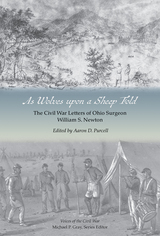
William S. Newton (1823–1882) served the Union primarily as an assistant surgeon with the 91st Ohio Volunteer Infantry, but also spent a few months as acting surgeon with the 2nd Virginia Cavalry (US). Toward the end of the war, he was promoted to surgeon for the 193rd Ohio Volunteer Infantry. Newton’s units fought in the Appalachian Highlands, mostly in Virginia and West Virginia. He treated wounded soldiers after significant battles including Opequon and Cedar Creek. In May 1864, following the Battle of Cloyd’s Mountain, John Hunt Morgan’s Raiders captured Newton and other medical personnel. After three weeks, Newton and his fellow prisoners were given the option of either treating Confederate soldiers or going to Libby Prison; they chose the latter. Newton spent only three days at Libby Prison before being released, but the experience took a significant toll on his health.
The letters in this volume, addressed mostly to Newton’s wife, Frances, provide a window into fighting in the Appalachian borderlands, where the differences between battle, guerilla warfare, and occupation were often blurred. As a noncombatant, the doctor observed life beyond troop movements and the brutality of war. Newton’s detailed letters cover his living quarters, race relations, transportation and communication, the comfort of a good meal, and the antics of his teenage son Ned. This book provides new insights into the medical and social history of the war, the war in Western Virginia, local and regional history, the perspective of a noncombatant, life on the home front, and the porous lines between home and battlefront.
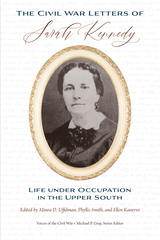
At the outbreak of the Civil War, Sarah Kennedy watched as her husband, D.N., left for Mississippi, leaving her alone to care for their six children and control their slaves in a large home in downtown Clarksville, Tennessee. D. N. Kennedy left to aid the Confederate Treasury Department. He had steadfastly supported secession and helped recruit local boys for the Confederate army. The Civil War Letters of Sarah Kennedy: Life under Occupation in the Upper South showcases the letters Sarah wrote to her husband during their time apart, offering readers an inside look at life on the home front during the Civil War through the eyes of a slave-owning, town-dwelling wife and mother.
Featuring fifty-two of Sarah Kennedy’s letters to her husband from August 16, 1862, to February 20, 1865, this important collection chronicles Sarah Kennedy’s personal struggles during the Civil War years, from periods of illness to lack of consistent contact with her husband and everything in between. Her love and devotion to her family is apparent in each letter, contrasting deeply with her resentment and harsh treatment toward her enslaved people as Emancipation swept through Clarksville. A useful volume to Civil War historians and women’s history scholars alike, The Civil War Letters of Sarah Kennedy pulls back the curtain on upper-middle-class family life and social relations in a mid-sized Middle Tennessee town during the Civil War and reveals the slow demise of slavery during the Union occupation.

William Henry Harrison Clayton was one of nearly 75,000 soldiers from Iowa to join the Union ranks during the Civil War. Possessing a high school education and superior penmanship, Clayton served as a company clerk in the 19th Infantry, witnessing battles in the Trans-Mississippi theater. His diary and his correspondence with his family in Van Buren County form a unique narrative of the day-to-day soldier life as well as an eyewitness account of critical battles and a prisoner-of-war camp.
Clayton participated in the siege of Vicksburg and took part in operations against Mobile, but his writings are unique for the descriptions he gives of lesser-known but pivotal battles of the Civil War in the West. Fighting in the Battle of Prairie Grove, the 19th Infantry sustained the highest casualties of any federal regiment on the field. Clayton survived that battle with only minor injuries, but he was later captured at the Battle of Stirling's Plantation and served a period of ten months in captivity at Camp Ford, Texas.
Clayton's writing reveals the complicated sympathies and prejudices prevalent among Union soldiers and civilians of that period in the country's history. He observes with great sadness the brutal effects of war on the South, sympathizing with the plight of refugees and lamenting the destruction of property. He excoriates draft evaders and Copperheads back home, conveying the intra-sectional acrimony wrought by civil war. Finally, his racist views toward blacks demonstrate a common but ironic attitude among Union soldiers whose efforts helped lead to the abolition of slavery in the United States.
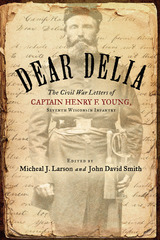
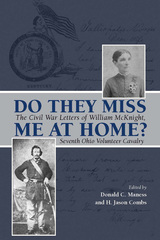
William McKnight was a member of the Seventh Ohio Volunteer Cavalry from September 1862 until his death in June of 1864. During his time of service, McKnight penned dozens of emotion-filled letters, primarily to his wife, Samaria, revealing the struggles of an entire family both before and during the war.
This collection of more than one hundred letters provides in-depth accounts of several battles in Kentucky and Tennessee, such as the Cumberland Gap and Knoxville campaigns that were pivotal events in the Western Theater. The letters also vividly respond to General John Hunt Morgan’s raid through Ohio and correct claims previously published that McKnight was part of the forces chasing Morgan. By all accounts Morgan did stay for a period of time at McKnight’s home in Langsville during his raid through Ohio, much to McKnight’s horror and humiliation, but McKnight was in Kentucky at the time. Tragically, McKnight was killed in action nearly a year later during an engagement with Morgan’s men near Cynthiana, Kentucky.
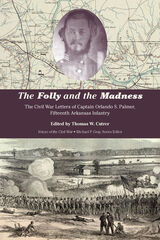
Though he initially felt Americans would see “the folly and the madness” of going to war, Orlando enlisted as a private in what would become Company H of the First (later Fifteenth) Arkansas Infantry, informing his sister that he had volunteered “not for position, not for a name, but from patriotic motivation.” However, he was ambitious enough to secure an appointment as Maj. Gen. William Joseph Hardee’s personal secretary; he then rose to become his regiment’s sergeant major, his company’s first lieutenant, and later captain and brigade adjutant. Soldier letters typically report only what can be observed at the company level, but Palmer’s high-ranking position offers a unique view of strategic rather than tactical operations.
Palmer’s letters are not all related to his military experience, though, and the narrative is enhanced by his nuanced reflections on courtship customs and personal relationships. For instance, Palmer frequently attempts to entertain Missie with witticisms and tales of his active romantic life: “We have so much to do,” he quips, “that we have no time to do anything save to visit the women. I am in love with several dozen of them and am having
a huge time generally.”
The Folly and the Madness adds depth to the genre of Civil War correspondence and provides a window into the lives of ordinary southerners at an extraordinary time.
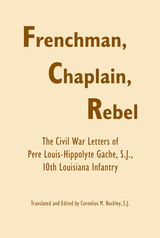
The American Civil War through the eyes of a French Jesuit chaplain.
"This book has a tantalizing quality, and it certainly is fresh literature for those who have watched the story of the Civil War unfold. . . . One cannot help but marvel at the research undertaken by Fr. Buckley. These letters of Fr. Gache cover such subjects as the duties of a chaplain, the lack of stimulating conversation in camp, whiskey as medication for diarrhea, the chaplain’s uniform, the oversupply of Catholic chaplains, descriptions of battles—Chancellorsville, Fredericksburg—chaplains as prisoners of war, the possibility of General Lee being chosen as the second president of the Confederacy, making candles for the alter and bleaching wax, procuring sacramental wine, conflicts with Protestant preachers, and the surrender of Richmond. Such subjects allow the personality and character of Hippolyte to stand out. . . . [The book] is interesting reading for all who love and admire the Jesuits. Its wealth of information makes it a must for others whose concern is the Confederate soldier and his God."
—Journal of Southern History
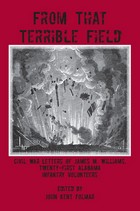
“The well-written and candid letters of a reasonably articulate Southern officer, who paints a lucid picture of everyday life in the Confederate army in a little-known theater… Williams’s letters, personally written and shot through with his sharp sense of humor and folksy artwork, provide an excellent account of a long neglected theater of the American Civil War.” – Western Pennsylvania History
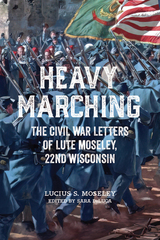
From 1862 to 1865, Moseley fought in the Civil War as an infantry soldier in Wisconsin’s 22nd Volunteers. Briefly captured and interred in a Confederate POW Camp, he returned to action and participated in Sherman’s Atlanta campaign. He marched in the Washington, D.C., Grand Review before returning to the Beloit area, where he remained for the rest of his life.
Mosely wrote detailed missives to his family in Beloit about his wartime experiences, demonstrating a flair for describing both camp life and battles. Frank and forthright, he was remarkably articulate, insightful, and thoughtful, whether describing mundane activities or the nearly unfathomable death of President Lincoln. These 125 letters, never before made available to scholars or students of the war, became touchstones and sources of pride for the Moseley family—and provide a uniquely candid and vivid view of this tumultuous period in US history.
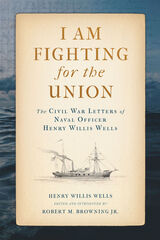
On May 18, 1862, Henry Willis Wells wrote a letter to his mother telling her in clear terms, “I am fighting for the Union.” Since August 1861, when he joined the US Navy as a master’s mate he never wavered in his loyalty. He wrote to his family frequently that he considered military service a necessary and patriotic duty, and the career that ensued was a dramatic one, astutely and articulately documented by Wells in more than 200 letters home, leaving an invaluable account of daily life in the Union Navy.
Wells joined the navy shortly after the war began, initially on board the Cambridge, attached to the North Atlantic Blockading Squadron, which patrolled the waters of the Chesapeake Bay. He witnessed the Battle of Hampton Roads and the fight between the ironclads CSS Virginia and the USS Monitor. Next, the Cambridge assisted in the blockade of Wilmington, North Carolina. In one instance, the warship chased the schooner J. W. Pindar ashore during her attempt to run the blockade, and Confederate forces captured Henry’s boarding party. After a short prison stay in the infamous Libby Prison in Richmond, his Confederate captors paroled Henry. He travelled back to Brookline, and soon thereafter the Navy Department assigned him to the gunboat Ceres, which operated on the sounds and rivers of North Carolina, protecting army positions ashore. Henry was on board during the Confederate attempt to capture Washington, North Carolina. During this April 1863 attack, Henry was instrumental in the town’s defense, commanding a naval battery ashore during the latter part of the fight.
His exceptional service gained him a transfer to a larger warship, the USS Montgomery, again on the blockade of Wilmington. Later the service assigned him to the Gem of the Sea, part of the East Gulf Blockading Squadron. Through his hard work and professionalism, he finally earned his first command. In September 1864, he became the commanding officer of the Rosalie, a sloop used as a tender to the local warships. Later he commanded the schooner Annie, also a tender. At the end of December 1864, however, the Annie suffered a massive explosion, killing all hands, including Wells. He was twenty-three years old when his life and career ended tragically. Wells’s letters document both his considerable achievements and his frustrations. His challenges, triumphs, and disappointments are rendered with candor. I Am Fighting for the Union is a vital and deeply personal account of a momentous chapter in the history of the Civil War and its navies.
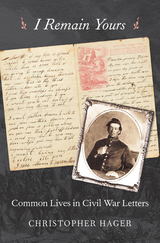
When North and South went to war, millions of American families endured their first long separation. For men in the armies—and their wives, children, parents, and siblings at home—letter writing was the sole means to communicate. Yet for many of these Union and Confederate families, taking pen to paper was a new and daunting task. I Remain Yours narrates the Civil War from the perspective of ordinary people who had to figure out how to salve the emotional strain of war and sustain their closest relationships using only the written word.
Christopher Hager presents an intimate history of the Civil War through the interlaced stories of common soldiers and their families. The previously overlooked words of a carpenter from Indiana, an illiterate teenager from Connecticut, a grieving mother in the mountains of North Carolina, and a blacksmith’s daughter on the Iowa prairie reveal through their awkward script and expression the personal toll of war. Is my son alive or dead? Returning soon or never? Can I find words for the horrors I’ve seen or the loneliness I feel? Fear, loss, and upheaval stalked the lives of Americans straining to connect the battlefront to those they left behind.
Hager shows how relatively uneducated men and women made this new means of communication their own, turning writing into an essential medium for sustaining relationships and a sense of belonging. Letter writing changed them and they in turn transformed the culture of letters into a popular, democratic mode of communication.
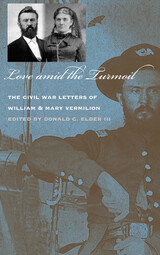
William Vermilion (1830-1894) served as a captain in Company F of the 36th Iowa Infantry from October 1862 until September 1865. Although he was a physician in Iconium in south central Iowa at the start of the war, after it ended he became a noted lawyer in nearby Centerville; he was also a state senator from 1869 to 1872. Mary Vermilion (1831-1883) was a schoolteacher who grew up in Indiana; she and William married in 1858. In this volume historian Donald Elder provides a careful selection from the hundreds of supportive, informative, and heart-wrenching letters that they wrote each other during the war—the most complete collection of letters exchanged between a husband and a wife during the Civil War.
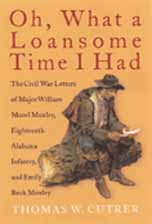
Most surviving correspondence of the Civil War period was written by members of a literate, elite class; few collections exist in which the woman's letters to her soldier husband have been preserved. Here, in the exchange between William and Emily Moxley, a working-class farm couple from Coffee County, Alabama, we see vividly an often-neglected aspect of the Civil War experience: the hardships of civilian life on the home front.
Emily's moving letters to her husband, startling in their immediacy and detail, chronicle such difficulties as a desperate lack of food and clothing for her family, the frustration of depending on others in the community, and her growing terror at facing childbirth without her husband, at the mercy of a doctor with questionable skills. Major Moxley's letters to his wife reveal a decidedly unromantic side of the war, describing his frequent encounters with starvation, disease, and bloody slaughter.
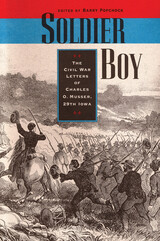
Soldier Boy makes a significant contribution to the literature of the common soldier in the Civil War. Moreover, it takes a rare look at the Trans-Mississippi theater, which has traditionally been undervalued by historians.
Always Musser dutifully wrote and mailed his letters home. With a commendable eye for historical detail, he told of battles and marches, guerrilla and siege warfare, camp life and garrison soldiering, morale and patriotism, Copperheads and contraband, and Lincoln's reelection and assassination, creating a remarkable account of activities in this almost forgotten backwater of the war.

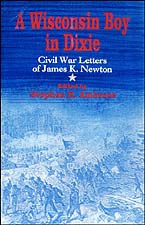
“When I wrote to you last I was at Madison with no prospect of leaving very soon, but I got away sooner than I expected to.” So wrote James Newton upon leaving Camp Randall for Vicksburg in 1863 with the Fourteenth Wisconsin Volunteer Infantry. Newton, who had been a rural schoolteacher before he joined the Union army in 1861, wrote to his parents of his experiences at Shiloh, Corinth, Vicksburg, on the Red River, in Missouri, at Nashville, at Mobile, and as a prisoner of war. His letters, selected and edited by noted historian Stephen E. Ambrose, reveal Newton as a young man who matured in the war, rising in rank from private to lieutenant.
A Wisconsin Boy in Dixie reveals Newton as a young man who grew to maturity through his Civil War experience, rising in rank from private to lieutenant. Writing soberly about the less attractive aspects of army life, Newton's comments on fraternizing with the Rebs, on officers, and on discipline are touched with a sense of humor—"a soldier's best friend," he claimed. He also became sensitive to the importance of political choices. After giving Lincoln the first vote he had ever cast, Newton wrote: "In doing so I felt that I was doing my country as much service as I have ever done on the field of battle."
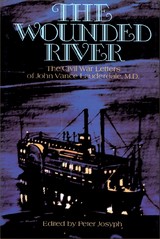
The Wounded River takes the reader back more than 130 years to reveal a marvelous, first-hand account of nineteenth-century warfare. In the process, the work cuts the legends and mythology that have come to frame and define accounts of America's bloodiest war. Of equal significance, Peter Josyph's editorial work on this superb collection of letters from the Western Americana Division of Yale University's Beinecke Rare Book and Manuscripts Library enhances and clarifies Lauderdale's experinces as a surgeon aboard the U.S. Army hospital ship D. A. January.
The reader looks on while Lauderdale, a New York civilian contract surgeon, operates on hundreds of Confederate and Union wounded. The young doctor's clear writing style and his great compassion for these unfortunate men whose bodies were ripped apart by bullets, shell fragments, and bayonets permits us to catch a disturbiing glimpse of what modern warfare does to humanity. Finally, we learn of Lauderdale's motives for volunteering, his impressions of the "hospital ship" D. A. January, Confederate morale, the Abolitionist cause, and black slavery. The Wounded River is a must read for anyone interested in the real American Civil War.
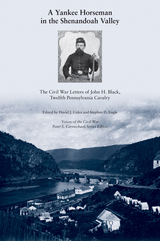
In many ways, John H. Black typified the thousands of volunteers who fought for the Union during the Civil War. Born in 1834 and raised on his family’s farm near Allegheny Township, Pennsylvania, Black taught school until he, like many Pennsylvanians, rushed to defend the Union after the attack on Fort Sumter in April 1861. He served with the Twelfth Pennsylvania Cavalry, one of the Union’s most unruly, maligned, and criticized units.Consistently outperformed early in the conflict, the Twelfth finally managed to salvage much of its reputation by the end of the war. Throughout his service, Black penned frequent and descriptive letters to his fiancée and later wife, Jennie Leighty Black. This welcome volume presents this complete correspondence for the first time, offering a surprisingly full record of the cavalryman’s service from 1862 to 1865 and an intimate portrait of a wartime romance.
In his letters, Black reveals his impassioned devotion to the cause, frequently expressing his disgust toward those who would not enlist and his frustration with friends who were not appropriately patriotic. Despite the Twelfth Pennsylvania’s somewhat checkered history, Black consistently praises both the regiment’s men and their service and demonstrates a strong camaraderie with his fellow soldiers. He offers detailed descriptions of the regiment’s vital operations in protecting Unionists and tracking down and combating guerrillas, in particular John Singleton Mosby and his partisan rangers, providing a rare first-person account of Union counterinsurgency tactics in the Lower Shenandoah Valley. In the midst of portraying heated and chaotic military operations, Black makes Jennie a prominent character in his war, illustrating the various ways in which the conflict altered or nurtured romantic relationships.
One of the few compilations of letters by a long-term Yankee cavalry member and the only such collection by a member of the Twelfth Pennsylvania, A Yankee Horseman in the Shenandoah Valley provides new insights into the brutal, confused guerrilla fighting that occurred in northwestern Virginia. Moreover, these letters make a significant contribution toward an emerging consensus that Yankee cavalry—often maligned and contrasted with their celebrated Confederate foes—became a superior fighting force as the war progressed.
David J. Coles, professor of history at Longwood University, is the associate editor of the Encyclopedia of Civil War, coauthor of Sons of Garibaldi in Blue and Gray, and coeditor of the Encyclopedia of the American Civil War.
Stephen D. Engle, professor of history at Florida Atlantic University, is the author of Yankee Dutchman: The Life of Franz Sigel, Don Carlos Buell: Most Promising of All, and Struggle for the Heartland: The Campaigns from Fort Henry to Corinth.
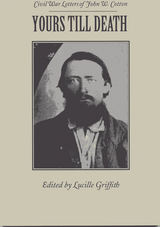
READERS
Browse our collection.
PUBLISHERS
See BiblioVault's publisher services.
STUDENT SERVICES
Files for college accessibility offices.
UChicago Accessibility Resources
home | accessibility | search | about | contact us
BiblioVault ® 2001 - 2024
The University of Chicago Press









